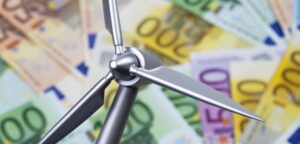
By Claire Contri, Markets Editor at The London Financial
With the outbreak of the war in Ukraine and the current environmental crisis, French Prime Minister Elisabeth Borne was clear: “Russia has already cut off most of Europe’s gas supply. And if it were to cut its exports completely, we know that Europe would run out of gas this winter. There is no immediate alternative to compensate.”
The energy crisis is happening all over Europe and is getting worse, not better, each day. With inflation rates peaking up to 10%, electricity and natural gas prices have reached record highs. If the oil supply sees a fall-winter decrease, combined with unfavourable weather, the global investment firm Russell Investments has argued that ‘there are prospects for a socioeconomic crisis.’ Again, it is all up to Russia to be willing to help the EU by increasing its natural gas deliveries this winter.
Yet observing the current geopolitical situation, this seems highly unlikely, so the questions are piling up: How will Europe get through this winter without enough gas? How will it be able to “compensate”? Can it turn current challenges into opportunities? Can it use the War in Ukraine as a good alibi to accelerate the European Green Deal?
Going back to fossil fuel energy supplies
2022 marked the year of another growing issue: climate change and environmental degradation. At least in France, Macron’s government stated, “Climate change is no longer an inconvenient truth; it is a destructive reality.” As there is no longer time for half measures, one way to overcome this situation is to adopt “energy sobriety collectively.” Energy sobriety means consuming less energy. Less energy for citizens, but less energy for the government, especially for companies.
Following Ursula Von Der Leyen’s belief that it is “now time for consumers to benefit from the low costs of low carbon energy sources, like renewables,” the EU has already put measures to cut gas consumption by 15% before next spring. France, on the other hand, has been setting up its action plan to tackle this issue: “The state must set an example (…) each ministry must finalize in September a sobriety plan to reduce our energy consumption by at least 10%“, stated Borne in a speech given at an event organized by the Medef, the leading French business lobby group.
The EU’s strategy is now crystal clear: To become independent from Russia and its fossil fuels before 2030.
The European Commission’s ‘Fit for 55‘ proposals would already reduce the EU’s annual greenhouse gas consumption by 30% by 2030. Thanks to the REPowerEU plan, Europe could remove the equivalent of the volume imported from Russia in 2021.
While Spain and Portugal have already limited local gas prices, Germany has set up a series of energy-saving measures, encouraging citizens and businesses on its territory to do the same. For example, the private sector will be encouraged to lower temperatures to a minimum, the overall goal being a decrease of 2% in total energy consumption.
As a study by the University of York predicts that 58% of Britons will be in fuel poverty next year, solutions are being sought. While leaders are falling short of ideas over such events, Think Tanks and associations are now proposing radical measures. Such solutions include discounted power tariffs, energy bill freezes, or the implementation of a “solidarity” tax hike for higher earners.
Achieving a net zero carbon energy system by around 2050 is possible and profitable
While the costs of nuclear energy have consistently increased over the last five decades, a study by Oxford University researchers has shown that the cost of crucial storage technologies needed for a renewable energy system, such as batteries and hydrogen electrolysis, is likely to fall dramatically. Professor Doyne Farmer, leader of the study at the Oxford Martin School’s Institute for New Economic Thinking, has said, “if we accelerate the transition, they will become cheaper faster. Completely replacing fossil fuels with clean energy by 2050 will save us trillions.”
The current crisis caused by Russia’s invasion of Ukraine highlights the risks of relying on expensive, insecure fossil fuels. As the world is now facing multiple problems, such as an inflation crisis, a national security crisis, a climate crisis, and a socioeconomic crisis, the world needs concrete solutions to benefit the economy, the planet, and social welfare.
Transitioning from an old to a new world and a new way of doing things is the only way for us to secure a future. We need actions, not words. Now.
The 21st century is the era of choice and dilemma. Overconsumption and destruction? Or sobriety and regeneration? There is a movement happening right now, a call to action from people, especially the next generation, to urge the world to act. As the outcomes of Covid and the war in Ukraine foreshadow what could happen in a few years, we all need to start becoming serious about what is happening.
Hence, could we say that Putin’s war in Ukraine highlights the urgency of accelerating our clean energy transition? Would energy sobriety add to the socioeconomic crisis ahead? Or, on the contrary, would it be a way to tackle two problems simultaneously collectively? That, we cannot know for sure now. We can be confident of the global shift in mentality though, at least in the EU. A change in mindsets where people, governments, and businesses will no longer be able to consume as they did before. Whether or not the war in Ukraine has marked “the end of abundance” in Europe, a green revolution is on its way.
Claire is a French-American Senior at ESSEC Business School in France. She has already done several internships in finance and loves writing articles. She also has a strong interest in sustainable finance and firmly believes that business can be a force for good and lead to positive change. Claire also serves as the Editor-In-Chief of The London Financial. Last but not least, she enjoys meeting new people from different backgrounds and experiences the most!
